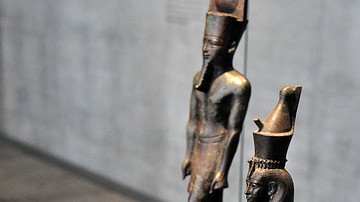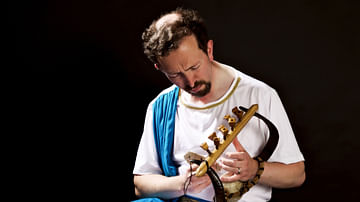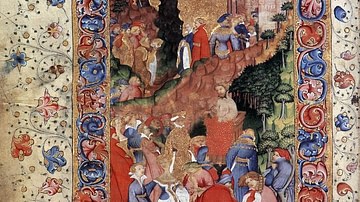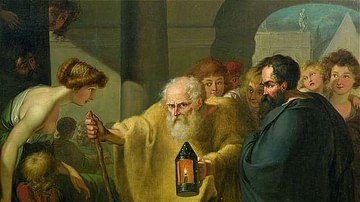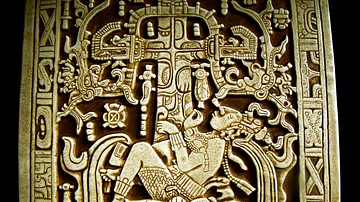Video
Join World History Encyclopedia as they talk to Michael Levy, a prolific composer of the ancient lyre and kithara all about his inspiration and knowledge of the instrument.
There are a few tortoiseshell lyres that survived, like the Elgin Lyre in the British Museum. Also, there are ancient Egyptian lyres that have survived. Michael got from Luthieros, a replica of the Leiden Lyre, which is preserved in Leiden and that dates to about 1500 BCE. It is an amazing thing. As far as ancient Greek lyres go, only the tortoiseshell lyres seem to have survived, the chelys lyres, as they called them. There are sadly, no surviving examples of the kithara, because it must have been very lightly constructed out of wood. Wood is more perishable than tortoiseshell.
The playing techniques are a mixture of what I can infer from ancient pictures of lyre players. When you see a lyre player in ancient Greek pottery and paintings, you have always got the left hand blocking specific strings, and one of these nice little chunky plectrums doing things. It is not like a harp, where you block strings to stop unwanted sustain. You are blocking strings that you do not need to play, and you are keeping open the strings you do want to play so you can create chords.
The kithara though has got a deeper tone to it. In ancient Greek music, only the professionals played the kithara, whereas the chelys (Greek for the tortoiseshell lyre), was for domestic use, for example at a symposium, an ancient Greek drinking party. Plato, in the Republic, advocates teaching young boys musical theories on the lyre because its notes are clear and pure.
— MICHAEL'S LINKS —
Michael Website https://www.ancientlyre.com
Find Michael on Spotify! https://open.spotify.com/artist/7Dx2vFEg8DmOJ5YCRm4A5v?si=emacIH9CRieFNGXRUyJ9
Find Michael on Youtube! https://www.youtube.com/channel/UCJ1X6F7lGMEadnNETSzTv8A
Luthieros, whose wonderfully recreated ancient Greek lyres & kithara has made Michael's ongoing musical mission possible for so long. They are reintroducing the recreated ancient Greek lyres & kithara back into the hands of modern musicians to 'continue where the ancients left off. https://www.luthieros.com
The specialist musician who performs the replica of the aulos Barnaby Brown https://barnabybrown.info/
— SUPPORT US VIA OUR PATREON —
https://www.patreon.com/join/whencyclopedia
— BUY OUR MERCH —
https://www.worldhistory.store/
— CHAPTERS —
0:00 Introduction
0:45 Why the lyre? Why did you start playing the lyre?
5:55 Do the different lyres and kitharas need different playing techniques?
10:20 Everything that you know about the lyre, is that all from surviving images?
12:17 How do you go about learning the lyre?
13:43 Performance of The Cave of Hermes
16:19 Ancient Tuning Methods
31:57 Is it meant to be played alone or with other instruments?
34:06 Performance of Hymn to the Stars
37:35 Tell us about the track, Hymn to the Stars!
41:43 Do you have a favourite song that you have composed?
43:47 Outro
— WANT TO KNOW MORE? —
Lyre https://www.worldhistory.org/Lyre/
Ancient Greek Music https://www.worldhistory.org/Greek_Music/
Aulos https://www.worldhistory.org/Aulos/
Kithara https://www.worldhistory.org/Kithara/
Hermes https://www.worldhistory.org/Hermes/
Pythagoras https://www.worldhistory.org/Pythagoras/
— WATCH NEXT —
Hermes: Greek God, Trickster and Messenger to the Gods https://www.youtube.com/watch?v=TlcqiJu6S9o&
The Greek God Apollo: The Myths of the Olympian God of Music, Medicine, the Sun and Archery https://www.youtube.com/watch?v=nntvIYtSY78
World Poetry Day: The Female Ancient Poets Sappho, Enheduanna and Zhuo Wenjun https://www.youtube.com/watch?v=7hRrBcWyb98
The History of Philosophy: Origins of Ancient Philosophy Around the Globe https://www.youtube.com/watch?v=IsdgFJBXb2w
— ATTRIBUTIONS —
The music used in this recording is the intellectual copyright of Michael Levy, a prolific composer for the recreated lyres of antiquity, and used with the creator's permission. Michael Levy's music is available to stream at all the major digital music platforms. Find out more on:
https://www.ancientlyre.com
https://open.spotify.com/artist/7Dx2vFEg8DmOJ5YCRm4A5v?si=emacIH9CRieFNGXRUyJ9
https://www.youtube.com/channel/UCJ1X6F7lGMEadnNETSzTv8A
— THUMBNAIL IMAGE —
Michael Levy
Copyright
Greece-0895 - Wide-bowled Drinking Cup
https://www.flickr.com/photos/archer10/2216572490/
Dennis Jarvis
CC BY SA 2.0 - https://creativecommons.org/licenses/by-sa/2.0/
World History Encyclopedia
www.worldhistory.org
#ancientlyre #michaellevy #kithara
Subscribe to this author
About the Author
![Kelly Macquire]()
Kelly is a graduate from Monash University who has completed her BA (Honours) in Ancient History and Archaeology, focussing on iconography and status in Pylos burials. She has a passion for mythology and the Aegean Bronze Age.
License & Copyright
Original video by Kelly Macquire. Embedded by Kelly Macquire, published on 14 December 2021. Please check the original source(s) for copyright information. Please note that content linked from this page may have different licensing terms.
The video and its description text are provided by Youtube. This website claims no authorship of this content; we are republishing it for educational purposes.


